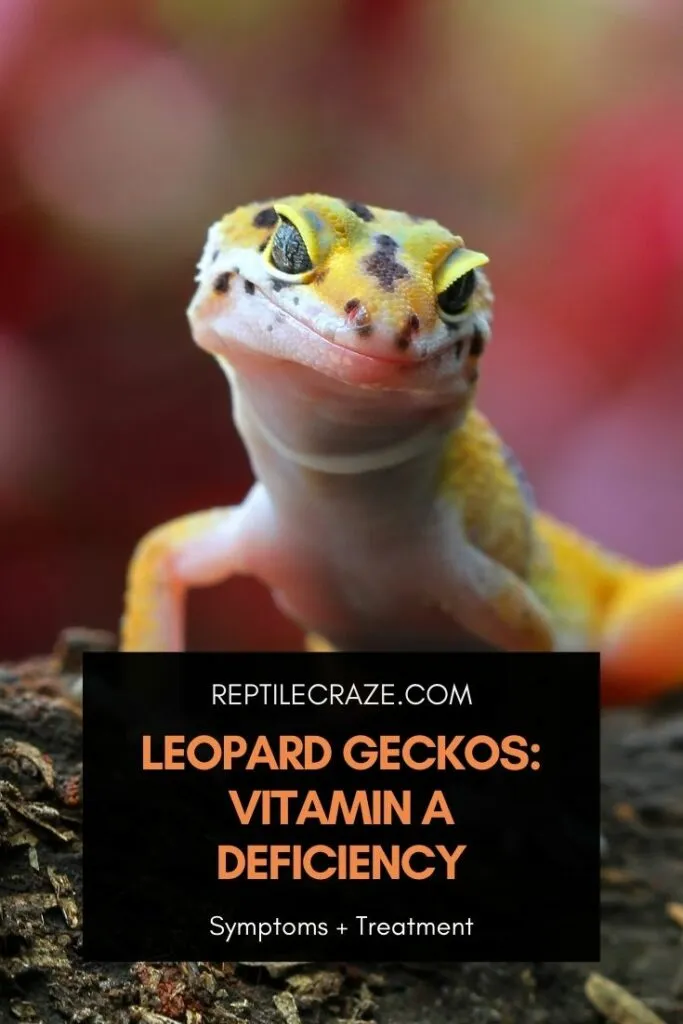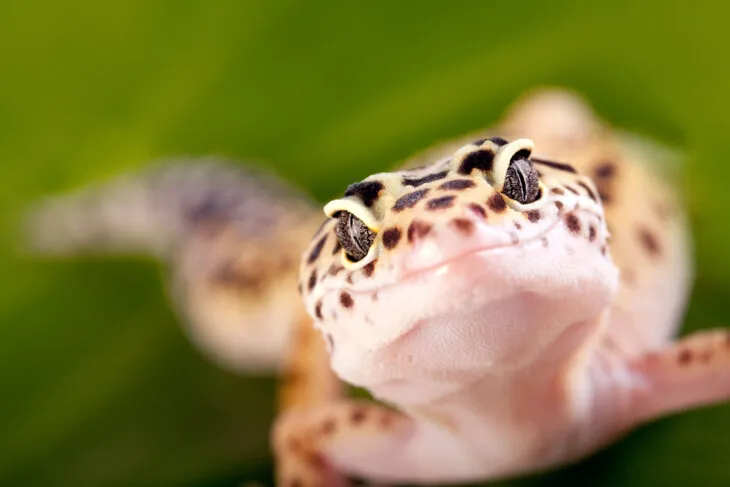
Did you know that Vitamin A is one of the most essential nutrients for reptiles, like Leopard Geckos? Vitamin A is required for skin cell growth and development. It’s also required for the proper functioning of the eyes and eyelids in them. Hence, it’s a must-have nutrient.
Leopard Geckos with Vitamin A deficiency exhibit symptoms like irregular shedding, hyperkeratosis of the eyes, fertility issues, sudden weight loss, and inactivity. The treatment often includes providing Leopard Gecko with Vitamin-A rich diet and supplements.
If you wish to know more about Vitamin A deficiency in Leopard Gecko, its symptoms, and treatments. Then, read on!
Table of Contents
What Causes Vitamin A Deficiency In Leopard Gecko?
Vitamin A deficiency, also known as Hypovitaminosis A, is quite common in Leopard Geckos. This is because of two major reasons as stated below.
Reason 1: Natural Diet
The diet of Leopard geckos mainly consists of insects. However, most insects contain Vitamin A in trace amounts only.
On the other hand, vegetables and fruits are typically the main sources of Vitamin A. But, experts often advise against feeding vegetables and fruits to leopard geckos as they cannot digest them.
We also explain why leopard geckos can’t eat that in these articles:
So, leopard geckos are more susceptible to Vitamin A deficiency due to their natural eating habits.
Reason 2: Improper Gut loading of Insects
Although leopard geckos cannot eat fruits and vegetables rich in Vitamin A, they can still eat insects gut-loaded with Vitamin A-rich foods.
Therefore, your leopard gecko may face a Vitamin A deficiency, if you don’t incorporate properly gut-loaded insects in their diet.
Tip: Do you need a vitamin schedule for your leopard gecko with all the necessary vitamins, when and how often to give them + the best multivatmin supplements? Check out our leopard gecko vitamin guide here!
Leopard Gecko Vitamin A Deficiency Symptoms
If you’re suspecting that your Leopard Gecko has Vitamin A deficiency, then look out for the below-mentioned symptoms.
Irregular or Abnormal Shedding
Typically, the cause of irregular or abnormal shedding in Leos is related to humidity or lighting. However, if you’re providing 40% humidity and UV-B light in their cage, then it might not be the real issue for abnormal shedding.
As Vitamin A helps in the growth and development of the epidermal cells, a lack of it may lead to skin-related issues. Therefore, if your Leo is struggling with shedding off its old skin, and growing a new one too, look out for Vitamin A deficiency.
Eye-Related Symptoms
Eye-related symptoms are quite common in reptiles, including leopard geckos, if they have Vitamin A deficiency. So, check for the below symptoms:
- Swelling of the eyelids – to the point that your Leo is unable to open its eyes.
- A cluster of dead skin near Leo’s eyes – creates an eye attachment that makes Leo look visually impaired.
- Cloudy Eye – due to conjunctivitis.
Note: Before ruling it out as Vitamin A deficiency, it’s best to consult a vet to ensure that there’s no other cause for eye-related symptoms like poor hygiene. If you want to avoid unnecessary trips and costs, we recommend to book an online vet here!
Fertility Issues
Depending on your Leopard gecko’s gender, the fertility issues take place due to Vitamin A.
- Male Leopard Geckos: In this case, the male Leo might act slow or sluggish while breeding.
- Female Leopard Geckos: In this case, the female Leo is often receptive. However, the eggs produced may be defective or weak due to Vitamin A deficiency.
Hence, ensure that your Leopard Gecko receives proper nutrients, including Vitamin A, during the breeding period.
Inactivity
Most leopard geckos see a decline in their activity when they’re suffering from Vitamin A deficiency. It is because Vitamin A is a key nutrient in the production of ATP – the building blocks of energy.
Due to the lack of Vitamin A, there might be a decline in the production of energy. Thus, making your Leopard Gecko lethargic and inactive.
Other Minor Symptoms
Apart from the major symptoms mentioned above, your Leo may also exhibit some minor symptoms if they’ve Vitamin A deficiency. These include:
- Nasal discharge
- Weight loss
- Hemipenal swellings
- Growth issues
- Breathing problems
- Stomatitis
- Congestion and wheezing
How Do You Treat Vitamin A Deficiency in Leopard Geckos?

The simple way to treat Vitamin A deficiency in Leopard Geckos is to give them a Vitamin A-rich diet. Given below are some ways to ensure that.
Feeding Vitamin A Rich Feeder Insects
As mentioned earlier, most feeder insects aren’t too rich in Vitamin A. Yet, you can try to feed your Leopard Gecko a combination of insects that still contains some amount of Vitamin A.
For instance, if you’re feeding your Leopard Gecko only mealworm, you might want to add other feeder insects like crickets or superworms to their diet.
The table below denotes the Vitamin A levels in various feeder insects.
| Feeder Insect | Vitamin A Content (IU Vitamin A/kg) |
| Crickets | 4,533 |
| Mealworms | 126 |
| Superworms | 3,317 |
| Waxworms | <333 |
Note: As you can observe from the table, feeder insects like mealworms and waxworms contain Vitamin A in trace amounts. So, try shifting your Leopard gecko to crickets and superworms as they’re richer in Vitamin A. You can also try giving them silkworms, BSL, or other forms of crickets.
Gut loading Insects With Vitamin A Rich Food
You cannot feed vegetables and fruits to your Leo directly. However, you can always gut-load the feeder insects with the right type of Vitamin A-rich
Given below is a list of the best fruits and vegetables to gut-load the feeder insect. These items are full of Vitamin A and will help in providing sufficient levels of it to your Leo.
- Spinach
- Collard greens
- Apples
- Mustard greens
- Ground legumes
- Cereals
- Rolled oats
- Sweet potatoes
- Oranges
- Carrots
- Broccoli
Keep in mind that you need to gut-load the feeder insects between 24 and 72 hours before feeding them to your Leo.
Dusting Feeder Insects With Vitamin A
Feeder insects are dusted with calcium supplements. However, you can also dust them with Vitamin A supplements twice a month. (Here is a good Vitamin A supplement.)
They’re available at the pet store easily. All you have to do is dust the
So, you need to limit the content of Vitamin A that you’re feeding to your Leo.
Injectable Dose of Vitamin A (In Rare Cases)
In very rare cases, Vitamin A is injected into Leopard geckos. However, according to studies, it may lead to Hypervitaminosis A. So, it is best to stick to oral supplementation of Vitamin A always.
If there’s a need for an injectable dose of Vitamin A, the veterinarian may state that.
Administering Saline Solution For Eye Infections
Vitamin A deficiency can lead to secondary problems like eye infections, especially the formation of cellular debris. You need to treat them to avoid further bacterial infection. Here is what you can do:
- Use a Q-tip to gently remove the debris from Leo’s eyes.
- Next, lubricate the eyes with a saline solution or eye drops.
The video below depicts how you can clean your Leopard Gecko’s eyes.
How to Give Leopard Gecko Vitamin A?
You can provide Vitamin A to your Leo through oral or injectable (in extremely rare cases) supplementation.
But, if you’re trying to increase your Leo’s Vitamin A levels, you need to take care. Supplementing your leopard gecko with too much Vitamin A may lead to Hypervitaminosis A.
Hypervitaminosis A is a condition wherein the Leopard Gecko’s body has more Vitamin A than the body requires. This further lead to additional problems such as:
- Dry or flaky skin
- Skin ulceration
- Dehydration
- Swollen neck and legs
According to Dr. Manu Jaiswal, a Ph.D. scholar in DUVASU Mathura in Veterinary Medicine Department, it is advisable to give 5000 IU/kg body weight of Vitamin A to your Leopard Gecko.
You can also avoid Hypervitaminosis A in Leopard Geckos by following these instructions:
- Try to provide supplements within the dosage range of 5000-10,000 IU/kg only. A toxic dose ranges between 50,000 to 100,000 IU/kg.
- Provide Vitamin A supplements twice a month only.
- Do not go for injectable supplementation. Instead, opt for oral supplementation to avoid the chances of overdosing your Leo with Vitamin A.
- Consult a veterinarian to get a better idea of the dosage as per your Leo’s age and weight.
Final Thoughts
Vitamin A deficiency can have a severe impact on your Leo’s health. In the worst-case scenario, it may also lead to lifelong visual impairment, infertility, and death.
Therefore, if you see your Leo exhibiting any signs of Vitamin A deficiency, consult a vet immediately. You would also need to make significant changes in their diet plan to avoid the risk of Vitamin A deficiency in the future.
If you don’t live near an exotic vet or if you would like to avoid unnecessary costs and trips, book an online vet. You can do so at Vetster. They offer fantastic, affordable service and 24/7 appointments. Check out Vetster here!
- Enchi Ball Python: A Unique and Stunning Morph of Python regius - March 27, 2025
- Emerald Tree Monitor: The Enigmatic Green Guardian of the Rainforest - March 26, 2025
- The Egyptian Cobra (Naja haje): A Fascinating Serpent - March 25, 2025
